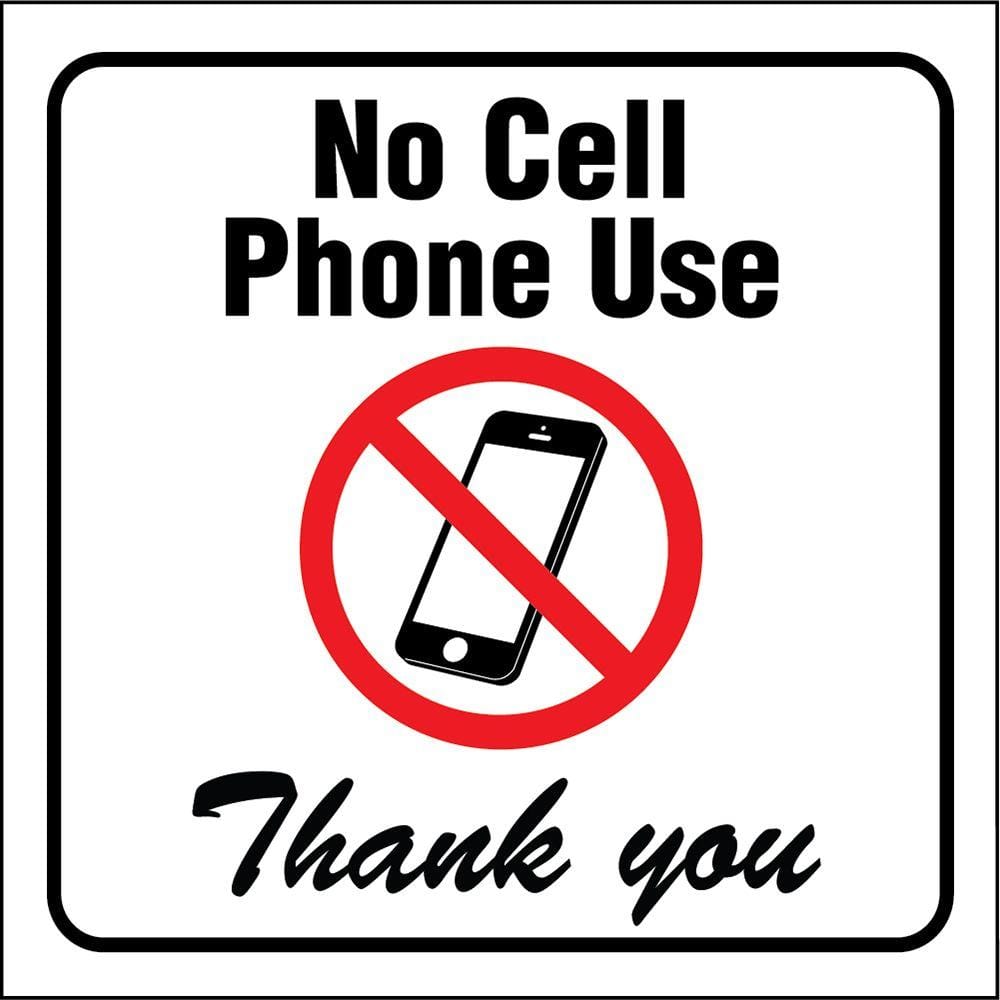Social media & technology

(Hy-Ko 4 in. X 4 in. vinyl no cell phones please sign HSV-205)
Social media, cell phones, and the use of technology is something a lot of people debate on whether it is destroying our society or benefiting us. I understand both sides but personally, I think all of this technology is hurting students more than benefiting them.
Many people, especially younger people, are addicted to their phones. By allowing students to have/use their phones in school, it only creates a bigger temptation to text, scroll through social media, post, etc. In Michigan, Forest Hills district banned cellphones during the day and lunch (Klein, 2019). I think it is a good idea to ban cellphones during the day so that the students are not distracted by them. I think banning the phones during lunch is a good idea as well because lunch is a time for the students to socialize and make friends. If they have their phones, they’d be glued to them and not interacting with their peers. Allowing students to use their phones during school also puts them at risk for failing. For example, “When you look at your phone it usually takes about 5 minutes to focus again on whatever they were doing before. Information is not being stored in your brain so work can’t be done” (Vitello, 2018). By the time students focus on what is being taught, they have already missed parts of the lesson and they won’t know that information for homework/tests.
One argument is that the use of smartphones is causing people to become depressed. Although it can’t be proven, data sets from 2012 show a spike in depression around that time because that's when people started using smartphones. It also seems to show girls have more mental health issues from social media. It is speculated that this could be because of the likes and comments they receive and see on others' posts. Another reason people dislike technology is because there is harmful information that is easy to access (Kamenetz, 2019). As teachers, we need to keep our students in mind. I think it could be beneficial to send a letter/email home to all the parents addressing the evil behind technology because some parents may not realize. Becoming depressed from social media is something to not take lightly because we don’t want to risk our students putting themselves in danger. For example, there could be a rise in suicide rates because of cyber bullying, not liking what you see online, wishing you looked like someone else, etc. Another big danger when it comes to social media is comparing your weight with others. For example, people tend to only post pictures they look good in. By having students, especially teenagers, see a person who is really skinny, it can make them pickup bad eating habits. In the documentary PLUGGED IN: The True Toxicity of Social Media Revealed (Mental Health Documentary), it says “and in the past three years, hospital admissions for teenagers with eating disorders have also almost doubled” (Willett, 2019). I think educating our students on these topics is important so they are aware of the dangers of technology and social media.
However, an opposing view is that the students' devices can be a great teaching tool. A popular teaching tool is Kahoot and students seem to really enjoy playing it. The Northwestern Pennsylvania school district also teaches their students how to use their devices responsibly (Klein, 2019). I do support the use of technology if you are using it as a teaching tool. I remember playing Kahoot throughout middle and high school and loving it. It does get the whole class engaged especially when they see their names on the leaderboard. I also like how Kahoot brings out a little friendly competition. I think this is also a motivation for students to remember the information learned so they can succeed in the game.
References
Hy-Ko 4 in. X 4 in. vinyl no cell phones please sign HSV-205. The Home Depot. (n.d.). https://www.homedepot.com/p/HY-KO-4-in-x-4-in-Vinyl-No-Cell-Phones-Please-Sign-HSV-205/204804981
Klein, A. (2019, September 6). Schools say no to cell phones. But is it a smart move? Education Week. Link
Kamenetz, A. (2019, August 27). NPR's The Scientific Debate over Teens, Screens, and Mental Health. National Public Radio. Link
Willett, R. (Director). (2019). Plugged-In: The Toxicity of Social Media Revealed. [YouTube Video]. Brick in the Wall Media.
Vitello, A. (2018, December 7). Middleborough Educational Television. http://www.middleboroughtv.com/10-reasons-why-cell-phones-shouldnt-be-allowed-in-school/

FROM CASSIDY S.:
ReplyDeleteAshley, I could not agree more; technology greatly hurts our students. Especially after the pandemic, we all find security on our devices. They enable us to knock out any time we should be used to venture out in the world. Another downside of using social media and technology so often is making us feel depressed. People out on social media often are cruel, and they make us feel insecure about ourselves and want us to fit into their image. However, technology indeed has positive outcomes. Students may need their devices as teaching tools. We are in a day and age where resources are easily accessible on computers and tablets instead of searching at their local library, so giving our students these advantages is beneficial for their academic performance. To sum up, what I have learned from your blog, we as educators need to create a middle ground where there is a time for technology and not a time for technology. Having an environment where we encourage less technology use during lecture time can help with our students’ mental health, as well as having better retainment of the new content. It has been researched previously that writing on pen and paper increases higher scores in assessments, so why do we not encourage less time on their devices for those reasons? They will still be there, but our students must understand why it is best for less technology.